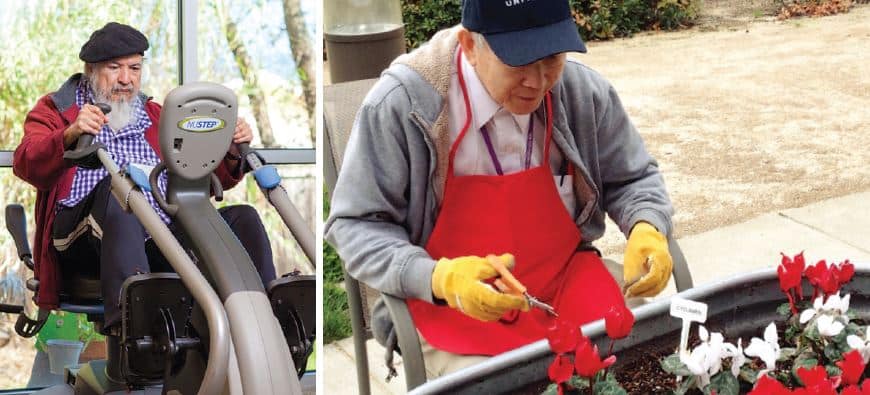Sometimes the best innovations come from simply flipping an existing model or way of doing things—and for Collabria Day Program’s director Celine Regalia, the inspiration came in the form of a random flier that landed on her desk.
At the Day Program, the traditional model is a program with schedules and activities that are often based on the participants’ diagnoses as a group, which can have an “if it’s Tuesday, it’s meatloaf” predictability. Structure and consistency are important for some participants, but these don’t always address an individual’s personal story, goals, needs, or interests, and can create frustration, a lack of engagement and an unequal relationship between caregiver and participant.
While the Day Program team strove to create engaging and rich programming, Regalia thought there had to be a way to better individualize a group program to each participant’s needs. “I wanted to treat each of them as a person, not as an illness or disability. I wanted to create programming that would honor the life they had lived, and the life they now lived, despite appearances or expectations,” she explains.
When she received a flier offering information and training in a new “Person-Centered Care” model, she wondered if it was answering the very question she’d asked. She and the Day Program Nursing Services Manager Karen Proteau attended Wisconsin Alzheimer’s Association’s conference to learn more and see the model in action at Luther Manor Adult Day Services. They left with a copy of Person-Centered Care in Practice, a guiding text written by Lyn Geboy and Beth Meyer-Arnold, who had presented at the conference.
The program is built on the idea of using respect and empowerment to protect or, in some cases, restore participants’ personhood. Their life stories drive the program, so rather than placing individuals in existing activities or programs—putting the peg in an existing hole—Person Centered Care modifies the hole to fit the peg.
If Joan likes quilting, or Tom likes singing, programming is created around those activities in a way that allows those participants to help develop, and often facilitate, the activity.
With Person-Centered Care in Practice to guide team members, they reimagined programming to enhance existing physical activity and mental stimulation, and monitored for loneliness and depression, practices shown to improve participants’ brain health.
The result? Participants were almost immediately more engaged and empowered, but so were the staff and volunteers, which helped balance the relationship between participants and staff. Together, they build the program, and together, they reap the benefits of increased safety, neural plasticity, independence, and social connectivity.
Evidence-Based, Person-Centered Care
“We had found a way to remove stigma around attending an adult day center by developing a rich program that treats participants with respect, as an active member of their own care team and their community,” said Regalia.
The Person-Centered Care model, now used by Collabria Day Program for three years, is more open and organic, designed to give clients a sense of purpose. Some of its practices include:
- “We watch for anything that can be a detractor for each person—how the facility is set up physically, or if there is discomfort due to unfamiliarity or a lack of interest, for example—so we can remove anything that is a barrier to engagement,” says Proteau. “We pay attention to not just the words participants use, but to their emotions or behavior. If someone has difficulty sharing thoughts or needs, behavior can be the next-best way to communicate. Someone acting in a way that could be interpreted as ‘aggressive’ or ‘anxious’ may be reacting to an unfamiliar or uncomfortable setting. Once we discover and remove the cause, the behavior often disappears, and as we get to know more about our participants and their stories, we’re able to better identify any issue quickly.”
- The Day Program pairs or groups participants with similar interests to encourage self-directed activities. “For example, one participant had been a science teacher,” explains Regalia. “He loved to teach, so we worked with him to offer a science class for other participants. We have an ‘armchair travel’ program, and when we found out that two participants were of Greek heritage, we brought them together to co-lead a ‘trip’ focusing on the culture and history of Greece. Both of these gave participants the opportunity to share their knowledge, and to develop personal connections with others, increasing social confidence.
“Another participant was quite reserved. We learned that she loves to cook foods that reflect her Southern heritage, but is unable to do so because she lives in a board and care home. We made a batch of grits from her recipe to share with other participants, and as they enjoyed her dish, she reminisced about her life in the South, her family and cooking. She just opened up, even speaking into a microphone to share her stories, with a smile from ear to ear.
“These kinds of activities can have a lasting effect and help to create a community among participants who then are invested in looking out for each other,” she says.
In response, between 2012 and 2014, ADS doubled the number of programs available—in some cases adapting existing programs to be more person-centered—including horticulture therapy, participant-led activities, and quilting & sewing, and has received a grant to develop a fine arts program with participants.
- Empowering participants means not only looking at their pasts, but looking to their future, so the Day Program works to help them achieve personal goals, incorporating more therapies—physical, occupational, or speech—as needed, to help them accomplish those goals.
“Person-centered care is not a destination, but an ongoing journey,” Regalia explains. “By empowering participants to build connections, use their interests, and meet goals, we celebrate their individuality and uniqueness, and that means each new participant enriches our program.
“We measure success through how engaged each participant is, because when participants are socially engaged, they feel respected and valued, which is a birthright, no matter our age or condition.”

